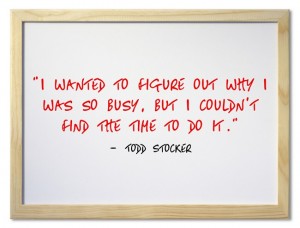Why your to do list is overwhelming (and what to do about it)
 Be honest. How many free books have you downloaded but not yet opened? How many courses have you enrolled in but not completed? How many mailing lists are you signed up to that you don't get around to reading? Have you been promising yourself you would sail around the world one day, but still haven't done that? Planned to write a novel but still haven't got started?
It's not that you are lazy. In fact it's exactly the opposite. So much good intention. So much self improvement. But sadly, there are only so many hours in the day.
Be honest. How many free books have you downloaded but not yet opened? How many courses have you enrolled in but not completed? How many mailing lists are you signed up to that you don't get around to reading? Have you been promising yourself you would sail around the world one day, but still haven't done that? Planned to write a novel but still haven't got started?
It's not that you are lazy. In fact it's exactly the opposite. So much good intention. So much self improvement. But sadly, there are only so many hours in the day.
Our modern world delivers nearly everything we could possibly want, twenty fours of every single day. We see all sorts of opportunities for things we could do and learn and be. This can ignite our passions and fuel us on to explore such exciting possibilities. But just because so much is possible, it doesn't mean we have to do it all. And we certainly don't have to do it all today.
Most of us add an inexhaustive list of things we 'should' do, or things we 'could' do to our list of routine daily activities, like our actual jobs, feeding ourselves, buying that birthday gift for a relative, and so on. No wonder our to do lists feel overwhelming. In part it is because we may not have drawn that distinction between things we must do (like eat dinner) and things we might do (like learning a foreign language, say). So these extra tasks hang over us. They cast just a little shadow at first, and perhaps we don't notice them much, much less recognise what it is that is actually weighing over us. But eventually they become oppressive, especially when they accumulate.
So the first step is to figure out which of the tasks on our list fall into the 'might-do' category. One option is to create a separate list more appropriately titled, so that you can remind yourself that these are aspirational possibilities rather than chores you have still not completed. A second option is a suggestion from Arianna Huffington's new book Thrive. She says you can complete a task simply by crossing it off your list. You don't have to do everything. Really... you don't.
Another reason a to do list is overwhelming is that we are never quite sure we have done enough. We want to exercise regularly, meditate regularly, read more, improve a particular professional skill. We might even have been to enough training seminars to know that we need 'SMART' goals. This may mean we have set ourselves minimums, like 3km of running 3 times per week. Do this for all the tasks on your list and you have given probably set enormous expectations for yourself.
In itself that is not a bad thing, but we have to be fair to ourselves and aware of our current capacity. As James Clear points out, we should only expect that which is sustainable, by setting upper bounds as well as lower bounds. This is a lesson from the corporate world. Southwest Airlines chose to place an upper bound on their company growth in order to give themselves a margin of safety and avoid burning out. It seemed to work for Southwest, and it makes a lot of sense for us too as James Clear explains.
Figuring out how much of an activity is too much for us in a particular day or week, leaves us the space to rest and creates space for the next item on the list. It also may leave us with a better sense of accomplishment.
If your to do list overwhelms you it is a good indication that you need to go back to what is truly important to you. What are you goals and values? Now pick your top 3-5. Make sure every item on your list is in line with one of those 3-5 goals and values - if not cross it out, or at the very least put it on a separate list. Be kind enough to yourself to make sure you do not have unrealistic expectations. Life is too short for that.
“Busyness is not a reason for not getting other things done. It is an excuse for not claiming your true priorities.” Alan Cohen
